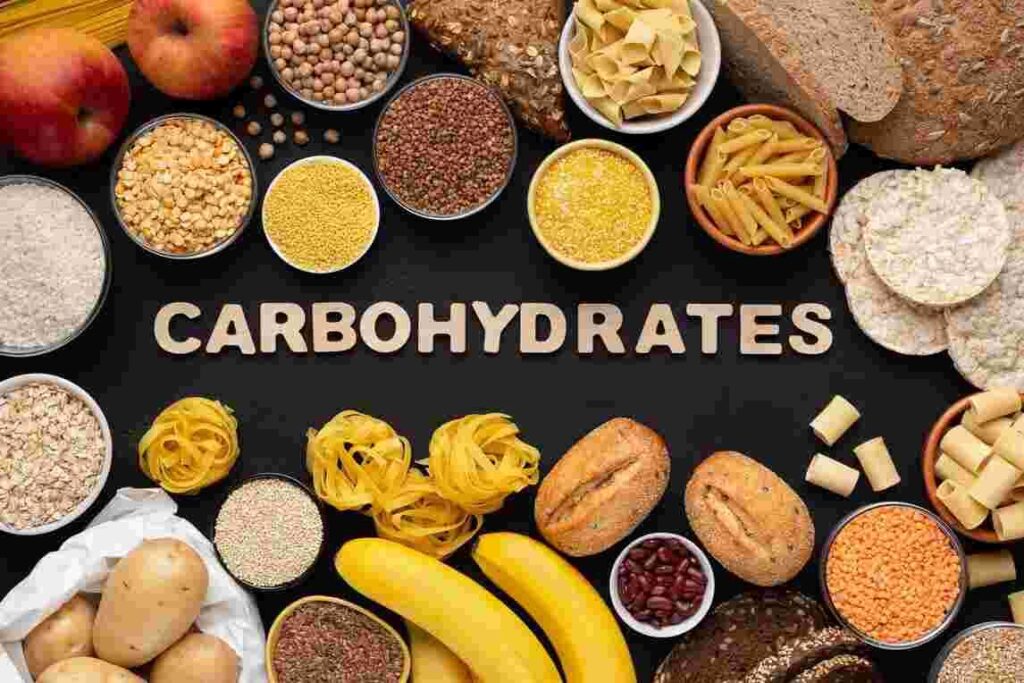Carbohydrates, classified as macronutrients, serve as one of the primary sources of energy for our bodies alongside proteins and fats.
These vital nutrients include sugars, fibers, and starches and can be sourced from a variety of foods such as grains, vegetables, fruits, as well as milk and dairy products.
As a fundamental food group, carbohydrates play a critical role in promoting a healthy lifestyle.
Some key functions of carbohydrate:
Energy Production:
Carbohydrates are the primary source of energy for our cells.
Brain Function:
Glucose derived from carbohydrates is essential for optimal brain function.
Glycogen Storage:
Excess glucose is converted into glycogen and stored in the liver and muscles. When energy is needed, glycogen is broken down into glucose and released into the bloodstream.
Muscle Fuel:
During physical activity, carbohydrates are broken down to provide energy for muscular contraction.
Protein Sparing action:
Sufficient carbohydrate consumption prevents the breakdown of proteins for energy. This ensures that proteins can fulfill their primary functions in the body, such as tissue repair and enzyme production.
Fat Metabolism:
Carbohydrates are necessary for the proper metabolism of dietary fats.
Fiber and Digestive Health:
Carbohydrates in the form of dietary fiber help maintain healthy digestion and prevent constipation. Fiber adds bulk to the stool and promotes regular bowel movements.
Nutrient Absorption:
Some carbohydrates, such as soluble fiber, aid in the absorption of certain nutrients, including vitamins and minerals, by slowing down their digestion and allowing for better uptake.
Blood Sugar Regulation:
Complex carbohydrates, such as whole grains and legumes, release glucose slowly into the bloodstream, helping to stabilize blood sugar levels
Cell Signaling and Communication:
Certain carbohydrates play a role in cell signaling and communication processes. They contribute to cellular recognition and interaction.
Here are some common food sources that are rich in carbohydrates:
Grains:
Foods like rice, wheat, oats, barley, and quinoa are high in carbohydrates. Whole grains, such as brown rice and whole wheat bread, are generally healthier options due to their higher fiber content.
Starchy Vegetables:
Potatoes, sweet potatoes, corn, and peas are examples of starchy vegetables that are rich in carbohydrates.
Legumes:
Beans, lentils, chickpeas, and other legumes are excellent sources of carbohydrates, along with providing a good amount of protein and fiber.
Fruits:
Most fruits contain carbohydrates in the form of natural sugars. Bananas, apples, oranges, grapes, and berries are all nutritious options.
Dairy Products:
Milk and yogurt contain carbohydrates in the form of lactose, a natural sugar found in milk. However, it’s important to choose low-fat or unsweetened varieties to avoid excess sugar and fat intake.
Sugary Foods:
Foods like candies, chocolates, cookies, cakes, and sugary drinks are high in simple carbohydrates and should be consumed in moderation due to their low nutritional value.
Pasta and Noodles:
Pasta, spaghetti, macaroni, and other types of noodles are rich in carbohydrates and often serve as a staple food in many cuisines.
Breads and Cereals:
Bread, breakfast cereals, and other grain-based products are commonly consumed sources of carbohydrates. Opt for whole grain options to maximize fiber intake.
Honey and Maple Syrup:
These natural sweeteners contain carbohydrates, primarily in the form of simple sugars. However, they should be consumed sparingly due to their high sugar content.
Energy Bars and Sports Drinks:
These products are specifically designed to provide a quick source of carbohydrates for athletes and individuals engaging in intense physical activity.
Sources of dietary fiber:
Dietary fiber is a type of carbohydrate that cannot be digested by the human body.
Here are some common sources of dietary fiber:
Whole Grains:
Foods such as brown rice, whole wheat, oats, barley, and quinoa are rich in fiber. Choose whole grain options whenever possible to maximize fiber intake.
Fruits:
Fresh fruits, especially those with edible skins or seeds, are high in fiber. Examples include apples, berries, pears, oranges, and kiwi.
Vegetables:
Vegetables such as broccoli, Brussels sprouts, carrots, spinach, kale, and sweet potatoes are excellent sources of fiber.
Legumes:
Beans, lentils, peas, and chickpeas are high in fiber as well as protein, making them a nutritious addition to any diet.
Nuts and Seeds:
Almonds, chia seeds, flax seeds, pumpkin seeds, and other nuts and seeds are good sources of fiber as well as healthy fats.
Here are some potential consequences of a carbohydrate deficiency:
Low Energy Levels:
Without an adequate intake of carbohydrates, you may experience fatigue, weakness, and a lack of energy to perform daily activities.
Impaired Brain Function:
In the absence of enough carbohydrates, cognitive processes such as memory, concentration, and decision-making may be impaired.
Nutrient Deficiencies:
A deficiency in carbohydrates can lead to a lack of these nutrients, potentially increasing the risk of deficiencies in essential vitamins and minerals.
Muscle Wasting:
In the absence of carbohydrates, the body may break down muscle tissue to provide energy. This can result in muscle wasting and a loss of strength and muscle mass over time.
Improper Immune Function:
Inadequate carbohydrate intake can weaken the immune response, making you more susceptible to infections and illnesses.
Nutritional Imbalance:
A deficiency in carbohydrates can lead to an imbalanced diet, which may impact overall nutrition and health.
Blood Sugar Instability:
Without enough carbohydrates, blood sugar levels may become unstable, leading to hypoglycemia (low blood sugar) and its associated symptoms like dizziness, weakness, and confusion.
Digestive Issues:
Inadequate fiber intake due to a carbohydrate deficiency can result in digestive problems, such as irregular bowel movements and discomfort.
It’s important to note that while carbohydrates are necessary for our bodies, the type and quality of carbohydrates consumed also matter.
Prioritizing complex carbohydrates from whole grains, fruits, vegetables, and legumes is generally recommended over simple carbohydrates from refined sugars and processed foods.

